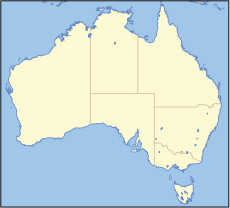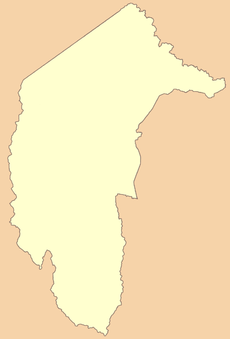ഫലകം:Infobox Australian Place/doc
| This is a documentation subpage for ഫലകം:Infobox Australian Place. It may contain usage information, categories and other content that is not part of the original ഫലകം page. |
| This ഫലകം employs intricate features of template syntax.
You are encouraged to familiarise yourself with its setup and parser functions before editing the template. If your edit causes unexpected problems, please undo it quickly, as this template may appear on a large number of pages. You can conduct experiments, and should test all major changes, in either this template's sandbox, the general template sandbox, or your user space before changing anything here. |
Usage
തിരുത്തുക- To use this template
- Copy the relevant blank template from the Blank Infobox Template Page into the beginning of your document, remembering to put the code at the very top of the article and the first word of the article on the very next line.
- Enter values for the fields as outlined in the table below. Fields left blank will automatically be hidden.
- Preview.
- Save the page with an appropriate edit summary.
- Examples
- Examples of this template can found on the Examples Page.
Fields
തിരുത്തുകAll fields used by this template are optional. The following fields are available:
| Field Name | Description | Valid for blank = all |
Source | Values |
| type | infobox type | 'city', 'suburb', 'town', 'lga', 'region' | ||
| name | name of locality | plain text | ||
| city | suburb | List of cities in Australia | plain text, link | |
| state | 'sa', 'vic', 'wa', 'tas', 'act', 'nt', 'qld', plain text, link | |||
| image | generic image of the locality | filename | ||
| imagesize | width of generic image of the locality | number | ||
| caption | caption for the locality image | wikitext (can contain links) | ||
| loc-x | locator map coordinates | region, lga, city, town | see Notes below | number |
| loc-y | locator map coordinates | region, lga, city, town | see Notes below | number |
| pop | population | all; use approx for region | ABS | number |
| pop_footnotes | population footnote for references | all; use approx for region | ABS | wikitext (can contain links) Best when used with <ref> </ref> tags and {{cite web}} |
| poprank | population rank | city | List of cities in Australia by population | number |
| density | population density | city, region | ABS | unformatted number (people/km²) |
| density_footnotes | population density footnote for references | city, region | ABS | wikitext (can contain links) Best when used with <ref> </ref> tags and {{cite web}} |
| est | established | year | ||
| postcode | suburb, town | List of postal codes in Australia | number | |
| coordinates | See Notes below | |||
| elevation | measured from sea level in metres | town, suburb | fallingrain.com | unformatted number (m) |
| elevation_footnotes | elevation footnote for references | town, suburb | fallingrain.com | wikitext (can contain links) Best when used with <ref> </ref> tags and {{cite web}} |
| area | city, lga, region | ABS | unformatted number (km²) | |
| area_footnotes | area footnote for references | city, lga, region | ABS | wikitext (can contain links) Best when used with <ref> </ref> tags and {{cite web}} |
| timezone | timezone | city, region | plain text, link | |
| utc | utc offset | city, region | "+" followed by number | |
| timezone-dst | summer timezone | city, region | plain text, link | |
| utc-dst | summer utc offset | city, region | "+" followed by number | |
| propval | town, suburb | domain.com.au | plain text, link | |
| mayor | Mayor of LGA | lga | plain text | |
| dist# | See Notes below | town, suburb, city (other cities) | travelmate.com.au, maps, Google earth, whereis (get directions), Route planner - Victoria, Australia | unformatted number (km) |
| dir# | See Notes below | town, suburb, city (other cities) | plain text, link | |
| location# | See Notes below | town, suburb, city | maps, Google earth | plain text, link |
| lga | local government area | suburb, town, region | plain text, link NSW Geographical Names Board (NSW only) | |
| lga2-lga4 | 2nd-4th LGAs | suburb, town, region | plain text, link | |
| seat | LGA seat | lga | plain text, link | |
| region | Name of region LGA is in | lga | plain text, link | |
| county | cadastral division (not in all areas) | Cadastral divisions of Australia NSW Geographical Names Board (NSW only) |
plain text, link | |
| landdistrict | WA, Tas | plain text | ||
| parish | NSW, Qld, Vic, Tas only | Cadastral divisions of Australia NSW Geographical Names Board (NSW only) |
plain text | |
| hundred | parts of SA & NT only | Cadastral divisions of Australia | plain text | |
| stategov | the state government electoral area | plain text, link | ||
| stategov2-stategov5 | 2nd-5th state government electoral areas | plain text, link | ||
| fedgov | the federal government electoral area | plain text, link | ||
| fedgov2-fedgov4 | 2nd-4th federal government electoral areas | plain text, link | ||
| logo | Logo of LGA | lga | Individual LGA website | image link |
| logosize | width of LGA logo | lga | Individual LGA website | number |
| url | LGA website address | lga | Individual LGA website | url link |
| maxtemp | max average annual temperature | suburb, town | Bureau of Meteorology | number (°C) |
| mintemp | mix average annual temperature | suburb, town | Bureau of Meteorology | number (°C) |
| rainfall | average annual rainfall | suburb, town | Bureau of Meteorology | unformatted number (mm) |
| near-n/ne/e/se/s/sw/w/nw | neighbours (suburb, lga or landmark) | suburb, lga | plain text, link |
Notes
തിരുത്തുകType
തിരുത്തുകThe infobox type affects the colour of the top bar of the infobox.
- Yellow: city
- Pink: suburb
- Green: town
- Blue: lga
- Purple: region
- Grey:
undefined
Footnotes fields
തിരുത്തുകAny references should be placed within the respective "_footnotes" field and not within the field reserved solely for a numeric value. For example, place the reference used for the area of City X in the parameter {{{area_footnotes}}} and not in the {{{area}}} parameter. Otherwise, an error may result.
Unformatted numbers and expression errors
തിരുത്തുകCertain fields require numeric values to be entered in an unformatted/raw fashion—i.e. 1000.0 NOT 1,000.0. If an expression error is present, simply remove any commas or spaces from the number.
loc-x and loc-y
തിരുത്തുകThe infobox includes a locator map function, used to identify the location of a region, lga, city or town, but not suburb, within the state by means of a small red dot. The map to be used is chosen automatically, based on the value of the "state" field. To determine the values of loc-x and loc-y, which are pixel and not geographic coordinates, right-click on the state (or the Australia one for other areas) and click 'Save As...' or equivalent. Then use an image editor (even Microsoft Paint will do) to determine the pixel co-ordinates of the desired location.
| Maps | ||
|---|---|---|
 Western Australia |
 Northern Territory |
 Queensland |
 Australia |
 South Australia |
 New South Wales |
 Australian Capital |
 Tasmaina |
 Victoria Territory |
Coordinates
തിരുത്തുകFor coordinates, use {{coord}} with display=inline,title. Please do not be overly precise.
Dist#, Dir# and Location#
തിരുത്തുക
This is the distance and approximate direction to another location. The '#' is replaced with a number between 1 and 5. Therefore distances for up to five locations can be listed using the range 'dist1' - 'dist5'. Direction from the locations can be specified use 'dir1' - 'dir5' and the locations can be listed as 'location1' - 'location5'. Each dist# must be partnered with an appropriate location#. Dir# is optional.
Where to find information
തിരുത്തുക- WikiProject Australian places - Useful Resources
- Australian Bureau of Statistics
- LGA links for each state
- Bureau of Meteorology > "Climate tables" (4th heading)
Microformat
തിരുത്തുകThe HTML markup produced by this template includes an hCard microformat, which makes the place-name and location parsable by computers, either acting automatically to catalogue articles across Wikipedia, or via a browser tool operated by a person, to (for example) add the subject to an address book. Within the hCard is a Geo microformat, which additionally makes the coordinates (latitude & longitude) parsable, so that they can be, say, looked up on a map, or downloaded to a GPS unit. For more information about the use of microformats on Wikipedia, please see the microformat project.
Sub-templates
തിരുത്തുകIf the place or venue has "established", "founded", "opened" or similar dates, use {{start date}} for the earliest of those dates unless the date is before 1583 CE.
If it has a URL, use {{URL}}.
Please do not remove instances of these sub-templates.
Classes
തിരുത്തുകhCard uses HTML classes including:
- adr
- agent
- category
- county-name
- extended-address
- fn
- label
- locality
- nickname
- note
- org
- region
- street-address
- uid
- url
- vcard
Geo is produced by calling {{coord}}, and uses HTML classes:
- geo
- latitude
- longitude
Please do not rename or remove these classes nor collapse nested elements which use them.
Precision
തിരുത്തുകWhen giving coordinates, please use an appropriate level of precision. Do not use {{coord}}'s |name= parameter.